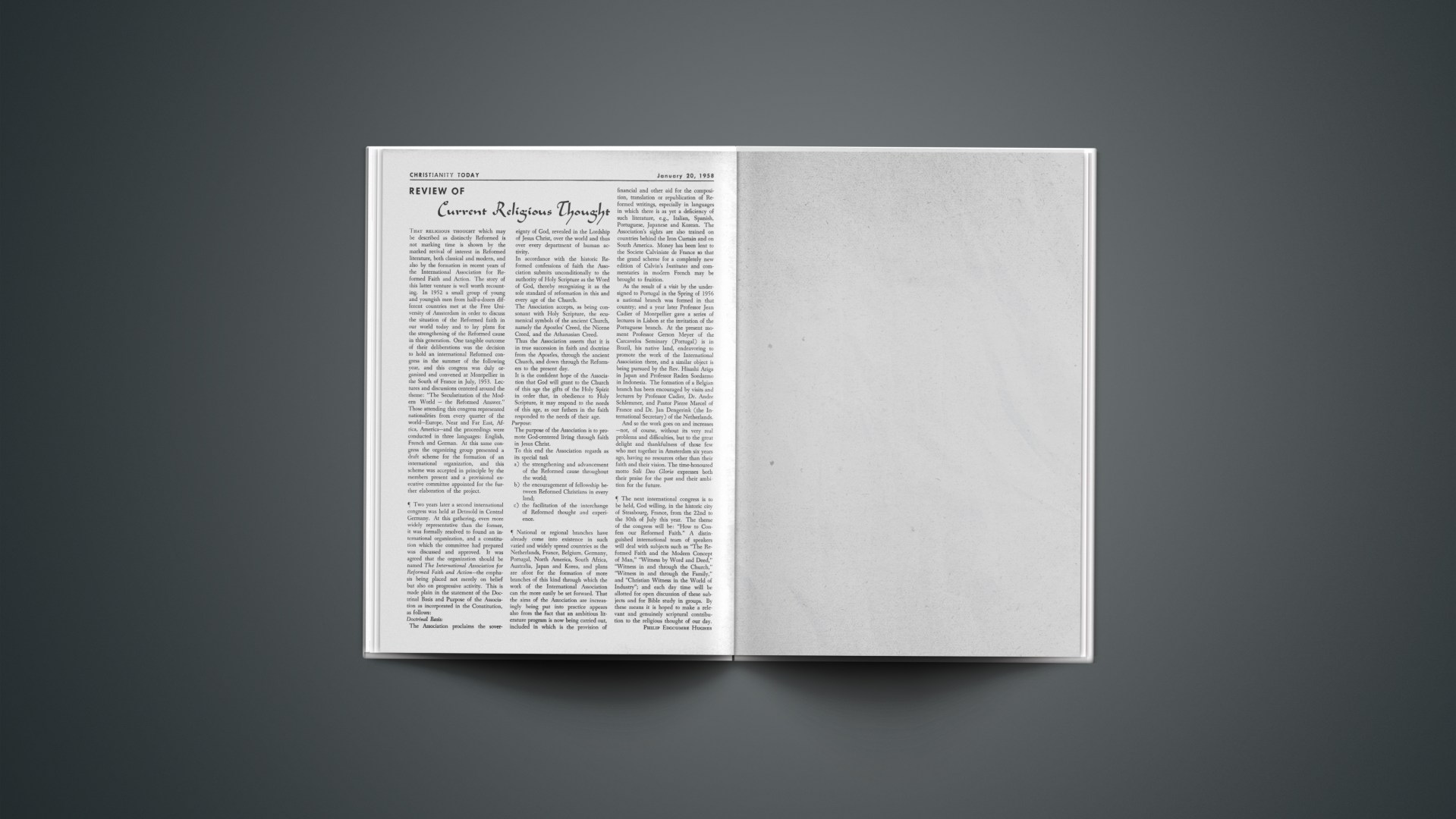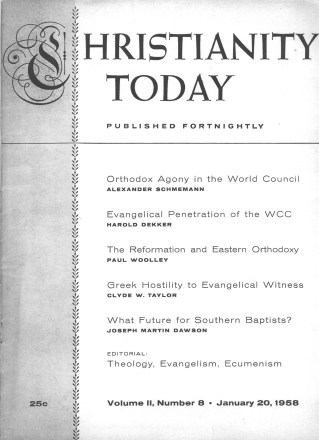That religious thought which may be described as distinctly Reformed is not marking time is shown by the marked revival of interest in Reformed literature, both classical and modern, and also by the formation in recent years of the International Association for Reformed Faith and Action. The story of this latter venture is well worth recounting. In 1952 a small group of young and youngish men from half-a-dozen different countries met at the Free University of Amsterdam in order to discuss the situation of the Reformed faith in our world today and to lay plans for the strengthening of the Reformed cause in this generation. One tangible outcome of their deliberations was the decision to hold an international Reformed congress in the summer of the following year, and this congress was duly organized and convened at Montpellier in the South of France in July, 1953. Lectures and discussions centered around the theme: “The Secularization of the Modern World—the Reformed Answer.” Those attending this congress represented nationalities from every quarter of the world—Europe, Near and Far East, Africa, America—and the proceedings were conducted in three languages: English, French and German. At this same congress the organizing group presented a draft scheme for the formation of an international organization, and this scheme was accepted in principle by the members present and a provisional executive committee appointed for the further elaboration of the project.
Two years later a second international congress was held at Detmold in Central Germany. At this gathering, even more widely representative than the former, it was formally resolved to found an international organization, and a constitution which the committee had prepared was discussed and approved. It was agreed that the organization should be named The International Association for Reformed Faith and Action—the emphasis being placed not merely on belief but also on progressive activity. This is made plain in the statement of the Doctrinal Basis and Purpose of the Association as incorporated in the Constitution, as follows:
Doctrinal Basis:
The Association proclaims the sovereignty of God, revealed in the Lordship of Jesus Christ, over the world and thus over every department of human activity.
In accordance with the historic Reformed confessions of faith the Association submits unconditionally to the authority of Holy Scripture as the Word of God, thereby recognizing it as the sole standard of reformation in this and every age of the Church.
The Association accepts, as being consonant with Holy Scripture, the ecumenical symbols of the ancient Church, namely the Apostles’ Creed, the Nicene Creed, and the Athanasian Creed.
Thus the Association asserts that it is in true succession in faith and doctrine from the Apostles, through the ancient Church, and down through the Reformers to the present day.
It is the confident hope of the Association that God will grant to the Church of this age the gifts of the Holy Spirit in order that, in obedience to Holy Scripture, it may respond to the needs of this age, as our fathers in the faith responded to the needs of their age.
Purpose:
The purpose of the Association is to promote God-centered living through faith in Jesus Christ.
To this end the Association regards as its special task
a) the strengthening and advancement of the Reformed cause throughout the world;
b) the encouragement of fellowship between Reformed Christians in every land;
c) the facilitation of the interchange of Reformed thought and experience.
National or regional branches have already come into existence in such varied and widely spread countries as the Netherlands, France, Belgium, Germany, Portugal, North America, South Africa, Australia, Japan and Korea, and plans are afoot for the formation of more branches of this kind through which the work of the International Association can the more easily be set forward. That the aims of the Association are increasingly being put into practice appears also from the fact that an ambitious literature program is now being carried out, included in which is the provision of financial and other aid for the composition, translation or republication of Reformed writings, especially in languages in which there is as yet a deficiency of such literature, e.g., Italian, Spanish, Portuguese, Japanese and Korean. The Association’s sights are also trained on countries behind the Iron Curtain and on South America. Money has been lent to the Societe Calviniste de France so that the grand scheme for a completely new edition of Calvin’s Institutes and commentaries in modern French may be brought to fruition.
As the result of a visit by the undersigned to Portugal in the Spring of 1956 a national branch was formed in that country; and a year later Professor Jean Cadier of Montpellier gave a series of lectures in Lisbon at the invitation of the Portuguese branch. At the present moment Professor Gerson Meyer of the Carcavelos Seminary (Portugal) is in Brazil, his native land, endeavoring to promote the work of the International Association there, and a similar object is being pursued by the Rev. Hisashi Ariga in Japan and Professor Raden Soedarmo in Indonesia. The formation of a Belgian branch has been encouraged by visits and lectures by Professor Cadier, Dr. Andre Schlemmer, and Pastor Pierre Marcel of France and Dr. Jan Dengerink (the International Secretary) of the Netherlands.
And so the work goes on and increases—not, of course, without its very real problems and difficulties, but to the great delight and thankfulness of those few who met together in Amsterdam six years ago, having no resources other than their faith and their vision. The time-honoured motto Soli Deo Gloria expresses both their praise for the past and their ambition for the future.
The next international congress is to be held, God willing, in the historic city of Strasbourg, France, from the 22nd to the 30th of July this year. The theme of the congress will be: “How to Confess our Reformed Faith.” A distinguished international team of speakers will deal with subjects such as “The Reformed Faith and the Modern Concept of Man,” “Witness by Word and Deed,” “Witness in and through the Church,” “Witness in and through the Family,” and “Christian Witness in the World of Industry”; and each day time will be allotted for open discussion of these subjects and for Bible study in groups. By these means it is hoped to make a relevant and genuinely scriptural contribution to the religious thought of our day.










